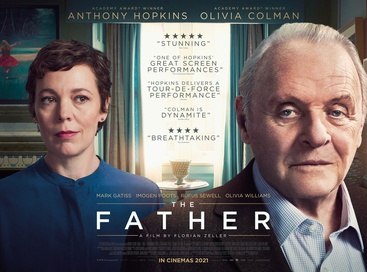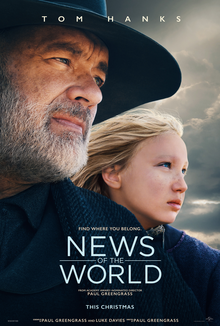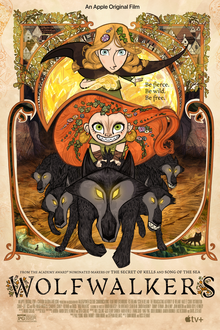Another year, another Pop Culture Scribe Oscars post. This year's is a bit later because awards season got pushed out (thanks Covid!). I also did not get to watch these films in a theater (thanks again Covid!) but they still amazed me and certainly served as a lifeline during an otherwise brutal year. I started this blog eight years ago because movies and television were the things that always kept me going in difficult times, and never has that been more obvious than during a global pandemic. These movies were emotionally resonant, inventive, sensory delights, but as always, some movies and performances were more riveting than others. So, as is tradition, let's delve into my Oscar hopes and predictions!
Best Picture: Oh where to begin? This is a great crop of movies, there isn't a Joker in the pack (yes, I'm still hurting from last year's Joker nomination). All eyes seem to be on
Nomadland to snag the big prize this year, and that would be fine by me. It seemed to capture the essence of 2020 as it spoke to the perils of Americans not being able to rely on a social safety net, as well as the beauty of this country and our collective longing to wander through the great outdoors instead of hunkering down in our homes. Beautifully shot, directed, and acted, it's a worthy winner. However, we all know that the nominee that brought me the most joy this year was
Promising Young Woman. I still periodically think about that film and am hoping it might be playing in a theater once I feel safe to go back so I can marvel at it all over again. That movie packed a punch in every possible way and my brain is still reeling all these months later. My runner-up in terms of visceral cinematic experiences would be
Sound of Metal, a film that made me appreciate my ears and continue my appreciation for Riz Ahmed. After that we have
The Father, which is a narrative wonder and emotional rollercoaster. There's
Minari, a movie that is even more poignant these days with all the focus on how we treat Asians in America and their representation in Hollywood, and then
Judas and the Black Messiah, which sadly continues to be poignant as the unrest around police brutality and #BlackLivesMatter never ceases. And then finally we have
The Trial of the Chicago 7 and
Mank, the two movies that fall into the category of "old school Oscar nominee." They are both perfectly fine movies, but they are traditional stories. The Trial of the Chicago 7 has some overlap in terms of time period and characters with Judas and the Black Messiah, and for my money, Judas is the far more compelling tale as it gives us the rarer story of the Black men involved in the fight for justice rather than the white ones. And Mank is your classic "hurrah for Hollywood!" that would ordinarily be the Oscar frontrunner. But thankfully, this year, with the Academy's increased focus on diversity and representation, they've moved on from the classic fare and served up a cinematic feast that makes me much more excited to go to the movies again.
Best Director: Last year I was bemoaning the fact that Greta Gerwig wasn't nominated for Best Director. And now this year, for the first time ever, we have two women nominated for Best Director at the same time! And it's also the first time a woman of color has been nominated! Yay! But also, what pitiful milestones to be achieving in 2021. I can't wait for the day we have five women nominated in this category, but until then, it's very exciting to have both Chloe Zhao and Emerald Fennel in contention for Nomadland and Promising Young Woman, respectively. It's particularly impressive than Fennel nabbed this nomination for her directorial debut, but Zhao is the favorite to win. We could have had three women nominated if Regina King had made it in for One Night in Miami, but she was bizarrely ousted by Thomas Vinterberg for
Another Round, which...ugh. That movie was fine, but it very much felt like it was playing to an audience of old white dudes, so no Thomas, no award for you. The other nominees are Lee Isaac Chung for Minari (I think it's a record to have two Asians nominated in this category, so hurrah!), and David Fincher for Mank. I'm happy for Chung and ambivalent for Fincher. But they will have to wait, because the ladies deserve the stage this year.
Best Actress: This race seems wide open, featuring incredible performances from five women in movies that were either also incredible or uplifted solely because of their leading ladies. Obviously, I'm going to be biased towards Carey Mulligan for Promising Young Woman, but I wouldn't quibble about a win for any other woman. Viola Davis was sweaty and sublime in
Ma Rainey's Black Bottom, Frances McDormand was quiet and extraordinary in Nomadland, Vanessa Kirby was a freaking powerhouse as she gave birth and then gave in to grief in
Pieces of a Woman, and Andra Day was the only astonishing thing about
The United States vs. Billie Holiday, literally destroying her body and voice for that performance. I'm excited to see these women in ALL. THE. THINGS. Let's just call a five-way tie and be done with it.
Best Actor: This is set to be awarded posthumously to Chadwick Boseman for Ma Rainey's Black Bottom and who's going to argue with that? I still can't quite believe he is dead and that we will never see him on screen again. So this award is in recognition of a great performance in that film, but also in recognition of all the movies he gave us and the future movies we have now lost the opportunity to see. Anthony Hopkins' final minutes in The Father wrecked me, Riz Ahmed's bewildered confusion and anger was crushing in Sound of Metal, and Steven Yuen's resolute striving for the American dream was heartbreaking in Minari (his nomination is the first for an Asian in this category, which is both good and startling news), but this is Boseman's award this year. And yes, Gary Oldman is also nominated for Mank, which in a classic Oscar year would be considered a frontunner, but in this year, was...meh.
Best Supporting Actress: Do not give this award to Glenn Close for
Hillbilly Elegy please (she's a fine actress, but the Oscar for that performance should be for Makeup & Hairstyling, not Acting). The universal favorite for this category is Yuh-Jung Youn for Minari and I would be thrilled if she won. She has such an intricate and complex role in that film as the grandmother who comes over from Korea to keep this family together, and the evolution of her relationship with her young American grandson is a masterclass. Of course, an upset by Maria Bakalova for
Borat Subsequent Moviefilm would be kind of bonkers and amazing, and would be a worthy reminder that comedies can be Oscar-worthy too. Olivia Colman already has an Oscar, so while she is perfect in The Father, I won't be too upset by her losing out in this category. And again, Amanda Seyfried is perfectly fine in Mank, but that movie was the least exciting thing to come out of Hollywood in 2020.
Best Supporting Actor: This is a lock for Daniel Kaluuya's masterful performance as Fred Hampton in Judas and the Black Messiah and should be the first of many Oscars to come. His co-star, Lakeith Stanfield, was also great, but there's no winning against that Kaluuya performance. In terms of a runner-up, I would probably go for Paul Raci in Sound of Metal, who had so much authenticity to lend to this script as he is actually the child of deaf parents. Talk about perfect casting. Sacha Baron Cohen was great in The Trial of Chicago 7 but that was a performance that felt like "acting" rather than inhibiting a role, unlike Leslie Odom. Jr., who perfectly captured Sam Cooke in
One Night in Miami but still can't quite compete with Kaluuya.
Best Original Screenplay: This is where Emerald Fennel could get her Promising Young Woman Oscar and I will be rooting for her with all my fingers and toes crossed. But there are other worthy nominees here: Lee Isaac Chung for Minari, Darius Marder for Sound of Metal (I imagine this screenplay looks very complex as most of the characters are deaf and need to communicate via machines or sign language), and Shaka King for Judas and the Black Messiah. They are all first-time nominees and they wrote elegant and riveting scripts that told unique and powerful stories. The only outlier is Aaron Sorkin for The Trial of the Chicago 7. Listen, it's a good script that plays with narrative in compelling ways and gets you invested in all the myriad characters populating the story. But it's also peak Sorkin and he already has an Oscar, so step aside for the new kids, OK?
Best Adapted Screenplay: Chloe Zhao is the frontrunner for her Nomadland script and as someone who has read the book that the movie is based on, I was wowed at how she took that source material and manipulated it into this movie. She added the fictional Frances McDormand character while also recruiting some of the real-life folk mentioned in the book, which gave the film an authenticity and tone that was truly impressive. Meanwhile, I'm not particularly keen on the other nominees. It's funny to see Borat Subsequent Moviefilm here, but it shouldn't be winning for its script since improv and the ability to roll with the reactions of the unsuspecting participants is so crucial to that film. The Father and One Night in Miami are both based on plays, and they do take advantage of the freedom afforded by cinema to expand the worlds of their characters a bit more, but there's still a stagey and dialogue-heavy quality to these scripts that remind you of their origins. And
The White Tiger was a perfectly acceptable film, but the script wasn't a very revolutionary adaptation of the source material, so no points for innovation there.
Those are my thoughts for the major categories. Some other predictions/wishes:
Soul would be my pick for
Best Animated Feature Film and I might need to watch it every few months to combat my periodic bouts of existentialism. Joshua James Richards ought to win for
Best Cinematography for Nomadland as no other film has ever made me yearn to visit South Dakota. Alexandra Byrne's costumes for
Emma were the last thing I saw on the big screen before the pandemic so I will sentimentally be rooting for her to win
Best Costume Design. And Sound of Metal needs to win
Best Sound because...I mean, come on.
So that's it for another year at the movies. It's been a strange one, but these films transported me to new places and times and introduced me to people I had never met before. During a time of social isolation and lockdown, movies gave me a sense of freedom and broadened my figurative horizons when my literal ones were very much limited. Here's hoping that I get to go back to the movie theater soon and marvel at the magic on the big screen.




.jpg)

